最新小学英语动词及专项训练
小学英语动词专项训练题一
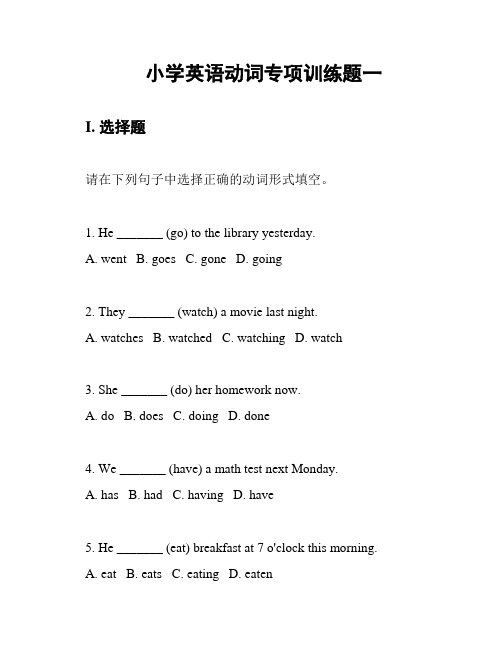
小学英语动词专项训练题一I. 选择题请在下列句子中选择正确的动词形式填空。
1. He _______ (go) to the library yesterday.A. wentB. goesC. goneD. going2. They _______ (watch) a movie last night.A. watchesB. watchedC. watchingD. watch3. She _______ (do) her homework now.A. doB. doesC. doingD. done4. We _______ (have) a math test next Monday.A. hasB. hadC. havingD. have5. He _______ (eat) breakfast at 7 o'clock this morning.A. eatB. eatsC. eatingD. eatenII. 填空题请根据句子意思,用正确的动词形式填空。
1. My mother _______ (cook) dinner every evening.2. They _______ (play) soccer in the park yesterday afternoon.3. We _______ (visit) my grandparents last weekend.4. The cat _______ (sleep) on the sofa now.5. She _______ (do) her homework and then _______ (go) out to play.III. 改写句子请将下列句子改写为含有情态动词的句子。
1. He can ride a bike.2. She knows how to swim.3. They are able to speak English.4. We must finish our work before lunch.5. You should study hard every day.IV. 完成句子请根据所给的提示,完成下列句子。
小学英语语法专题训练:动词(含答案)
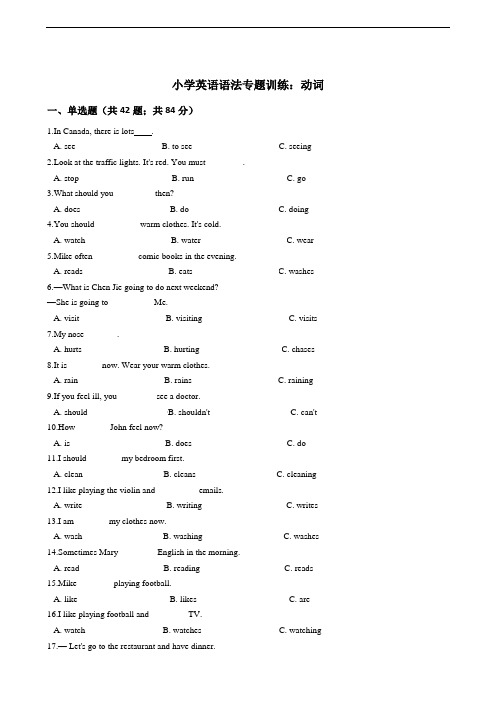
小学英语语法专题训练:动词一、单选题(共42题;共84分)1.In Canada, there is lots .A. seeB. to seeC. seeing2.Look at the traffic lights. It's red. You must ________.A. stopB. runC. go3.What should you _________then?A. doesB. doC. doing4.You should __________warm clothes. It's cold.A. watchB. waterC. wear5.Mike often __________comic books in the evening.A. readsB. eatsC. washes6.—What is Chen Jie going to do next weekend?—She is going to __________Me.A. visitB. visitingC. visits7.My nose _______.A. hurtsB. hurtingC. chases8.It is _______ now. Wear your warm clothes.A. rainB. rainsC. raining9.If you feel ill, you ________ see a doctor.A. shouldB. shouldn'tC. can't10.How _______ John feel now?A. isB. doesC. do11.I should _______ my bedroom first.A. cleanB. cleansC. cleaning12.I like playing the violin and _________ emails.A. writeB. writingC. writes13.I am _______ my clothes now.A. washB. washingC. washes14.Sometimes Mary ________ English in the morning.A. readB. readingC. reads15.Mike________ playing football.A. likeB. likesC. are16.I like playing football and ________ TV.A. watchB. watchesC. watching17.— Let's go to the restaurant and have dinner.— That _______interesting.A. soundsB. cleansC. shows18.— I have got a new book and a stamp about China. What about you? — I have got a new book about China, too. But I_______got a stamp.A. haveB. don't haveC. haven't19.Lin Tao can __________.A. drawB. drawsC. drawing20.—______you got a new stamp?— Yes, I have.A. HaveB. DoC. Are21._______ is her hobby.A. RunningB. RunsC. Runing22.Let's________to Chinatown now.A. to goB. goC. going23.Let's ______ to the park tomorrow.A. goingB. to goC. go24.I _______you can pass the exam. Because you work very hard.A. believeB. eatC. say25.—_______you got a hobby?— Yes, I have.A. DoB. AreC. Have26.—Can you speak English?—Yes, I _______.A. doB. haveC. can27.________table tennis is my hobby.A. PlayB. PlayingC. Plays28.Can you ________ my pen friend?A. areB. amC. be29.Look at the library_______. It says, "Don't talk in the room."A. ruleB. roomC. sound30.—I don't know what to do. Can you help me?—You _______think it hard by yourself.A. doB. shouldC. will31.— Do you understand me?— Yes, because I can_____a little English.A. speakB. tellC. say32.My sister can _______ pictures.A. drawB. drawsC. drawing33.Look! The girl is ________ a football game.A. lookingB. seeingC. watching34.—______you______cars?—Yes, I do.A. Have; gotB. Do; collectC. Are; having35._______ is my hobby.A. Collecting stampsB. Collecting stampC. Collect stamps36.My father likes at the weekends.A. going to fishB. go fishingC. going fishD. going fishing37.Did Nancy after school?A. walk homeB. walk to homeC. walked to homeD. walk to the home38.My father often __________stories to us in the evening.A. tellsB. talkC. saysD. speaks39._______ your mother see a film yesterday evening?A. AreB. DidC. WasD. Is40.He could not _________ his book.A. findB. look afterC. foundD. looked41.My mother likes __________new clothes and she can_________ nice clothes.A. make; makeB. making; makesC. making; makeD. making; making42.I'm going to ___________ him English.A. teachsB. teachesC. teach二、填空题(共1题;共1分)43.—What's your hobby?—________(collect stamps) is my hobby. It's my stamp album (册子).三、选词填空(词汇运用)(共5题;共5分)44.He works very hard and ________ (stay/stays) healthy.45.—How ________ (do/does) he go to work?—By car.46.—What does Linda ________ (look like/like)?—She is thin and short.47.I think we should ________ (goes/go) to Shanghai first.48.She________ (can't/can) walk, she is too young.四、语法填空(共1题;共1分)49.Lets________ (play) basketball this weekend.五、单词拼写(词汇运用)(共1题;共6分)50.写出下列动词的第三人称单数形式。
小学英语情态动词知识点及练习

情态动词【知识要点】:情态动词(Modal verbs)本身有一定的词义, 表示语气的单词。
但是不能独立作谓语, 只能和动词原形一起构成谓语。
情态动词用在行为动词前, 表示说话人对这一动作或状态的看法或主观设想。
情态动词虽然数量不多, 但用途广泛, 主要有下列: can (could), may (might), must, need, ought to, dare (dared), shall (should), will (would) must not.情态动词无人称和数的变化, 情态动词后面跟的动词须用原形, 否定式构成是在情态动词后面加 "not"。
疑问形式是将情态动词提至主语前。
个别情态动词有现在式和过去式两种形式, 过去式用来表达更加客气, 委婉的语气, 时态性不强, 可用于过去, 现在或将来。
情态动词属非及物动词, 故没有被动语态。
【典型例题】:【专题一】:can和could的用法【例1】Can you lift this heavy box?(体力)【解析】表示能力(体力、知识、技能)【练习】1.Mary speak three languages.(知识)2... yo.skate?(技能)此时可用be able to代替。
Can只有一般现在时和一般过去式;而be able to 则有更多的时态。
I’ll not be able to come this afternoon.当表示“经过努力才得以做成功某事”时应用be able to,不能用Can。
【例2】-----Can I go now?----.Yes.yo.can..No.yo.can’t.【解析】表示请求和允许。
此时可与may互换。
在疑问句中还可用could,might 代替,不是过去式,只是语气更委婉,不能用于肯定句和答语中。
【练习】---- I come to see you tomorrow?---.Yes.yo.....----No.yo..../I’.afrai.not.【例3】Can this be true?【解析】表示推测(惊讶、怀疑、不相信的态度),用于疑问句、否定句和感叹句中。
(完整版)小学英语动词及专项训练
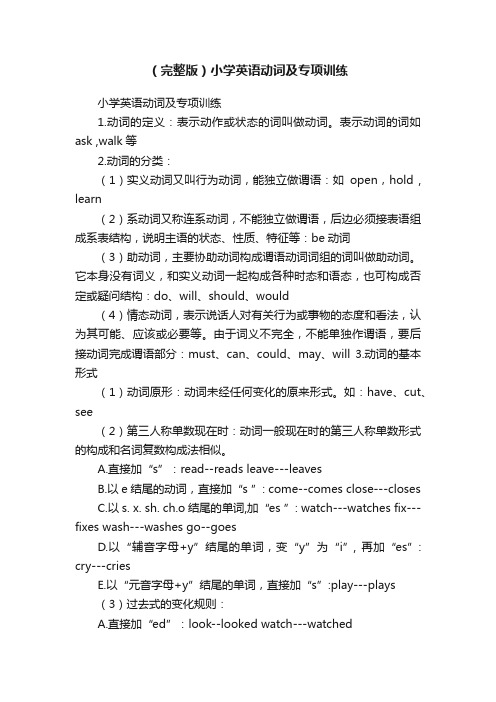
(完整版)小学英语动词及专项训练小学英语动词及专项训练1.动词的定义:表示动作或状态的词叫做动词。
表示动词的词如ask ,walk等2.动词的分类:(1)实义动词又叫行为动词,能独立做谓语:如open,hold , learn(2)系动词又称连系动词,不能独立做谓语,后边必须接表语组成系表结构,说明主语的状态、性质、特征等:be动词(3)助动词,主要协助动词构成谓语动词词组的词叫做助动词。
它本身没有词义,和实义动词一起构成各种时态和语态,也可构成否定或疑问结构:do、will、should、would(4)情态动词,表示说话人对有关行为或事物的态度和看法,认为其可能、应该或必要等。
由于词义不完全,不能单独作谓语,要后接动词完成谓语部分:must、can、could、may、will 3.动词的基本形式(1)动词原形:动词未经任何变化的原来形式。
如:have、cut、see(2)第三人称单数现在时:动词一般现在时的第三人称单数形式的构成和名词复数构成法相似。
A.直接加“s”:read--reads leave---leavesB.以e结尾的动词,直接加“s ”: come--comes close---closesC.以s. x. sh. ch.o结尾的单词,加“es ”: watch---watches fix---fixes wash---washes go--goesD.以“辅音字母+y”结尾的单词,变“y”为“i”, 再加“es”: cry---criesE.以“元音字母+y”结尾的单词,直接加“s”:play---plays(3)过去式的变化规则:A.直接加“ed”:look--looked watch---watchedB.以e结尾的动词,直接加“d”: live--lived love--lovedC.以“辅音字母+y”结尾的单词,变“y”为“i”, 再加“ed ”: cry---criedD.以“元音字母+y”结尾的单词,直接加“s ”:play---playedE.动词不规则变化表Infinitive Pasttense Infinitive Past tense1. am, is was2.keep kept3. are were4.let let5. become became6.make made7. begin began 8. meet met9. bite bit 10. put put11. blow blew 12.read read13. buy bought 14.ride rode15. catch caught 16.run ran17. come came 18.say said19. cost cost 20.see saw21. cut cut 22. sing sang23.dig dug 24. sit sat25.do did 26. sleep slept27. draw drew 28.speak spoke29. drink drank 30.sweep swept31. eat ate 32. take took33.fall fell 34.teach taught35. feed fed 36.tell told37.feel felt 38.thinkthought39. fly flew 40.throw threw41.forget forgot 42.understandunderstood43. get got 44.give gave45. wake woke 46.go went47. wear wore 48.grow grew49. win won 50.have/has had51. write wrote 52.know knew53 .break broke4.动词的时态一、一般现在时: 表示经常性、规律性习惯性的动作或现在存在的状态。
小学英语动词专项练习(解析版答案)
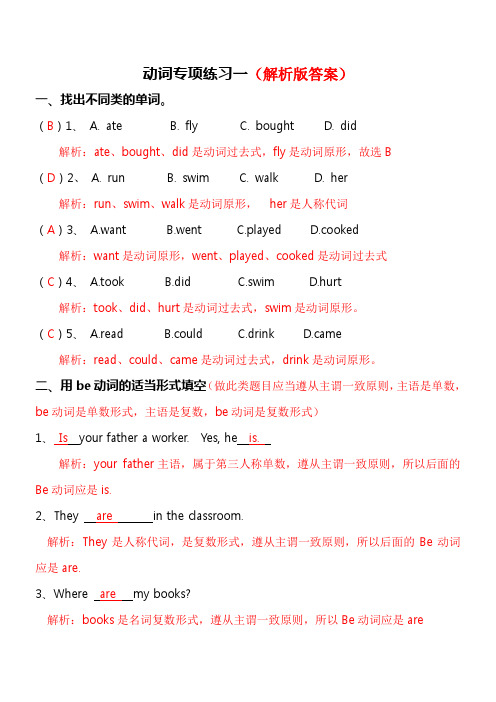
动词专项练习一(解析版答案)一、找出不同类的单词。
(B)1、A. ate B. fly C. bought D. did解析:ate、bought、did是动词过去式,fly是动词原形,故选B(D)2、A. run B. swim C. walk D. her解析:run、swim、walk是动词原形,her是人称代词(A)3、A.want B.went C.played D.cooked解析:want是动词原形,went、played、cooked是动词过去式(C)4、A.took B.did C.swim D.hurt解析:took、did、hurt是动词过去式,swim是动词原形。
(C)5、A.read B.could C.drink D.came解析:read、could、came是动词过去式,drink是动词原形。
二、用be动词的适当形式填空(做此类题目应当遵从主谓一致原则,主语是单数,be动词是单数形式,主语是复数,be动词是复数形式)1、Is your father a worker. Yes, he is.解析:your father主语,属于第三人称单数,遵从主谓一致原则,所以后面的Be动词应是is.2、They are in the classroom.解析:They是人称代词,是复数形式,遵从主谓一致原则,所以后面的Be动词应是are.3、Where are my books?解析:books是名词复数形式,遵从主谓一致原则,所以Be动词应是are4、These are her pears.解析:pears是名词复数形式,遵从主谓一致原则,所以Be动词应是are5、How much is the T-shirt?解析:how much意为“多少钱”时,可单独使用,也可构成词组how much money,但英语中常省略money,用来询问某物的价钱、价格。
how much后接be动词时,be是单数还是复数,取决于be之后的名词,T-shirt是名词单数形式。
小学专项练习动词的时态练习题及
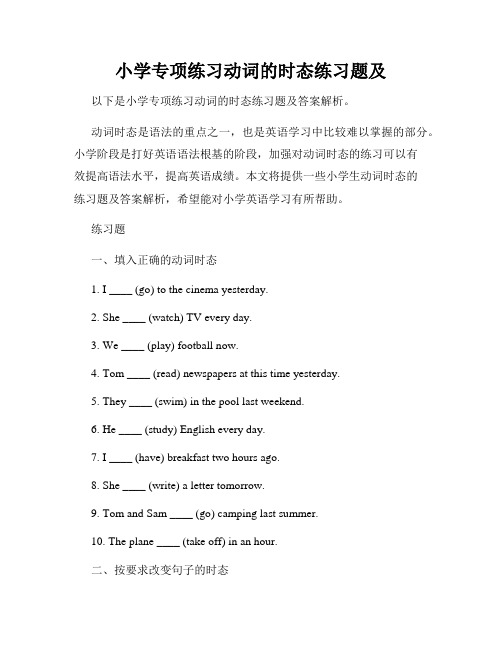
小学专项练习动词的时态练习题及以下是小学专项练习动词的时态练习题及答案解析。
动词时态是语法的重点之一,也是英语学习中比较难以掌握的部分。
小学阶段是打好英语语法根基的阶段,加强对动词时态的练习可以有效提高语法水平,提高英语成绩。
本文将提供一些小学生动词时态的练习题及答案解析,希望能对小学英语学习有所帮助。
练习题一、填入正确的动词时态1. I ____ (go) to the cinema yesterday.2. She ____ (watch) TV every day.3. We ____ (play) football now.4. Tom ____ (read) newspapers at this time yesterday.5. They ____ (swim) in the pool last weekend.6. He ____ (study) English every day.7. I ____ (have) breakfast two hours ago.8. She ____ (write) a letter tomorrow.9. Tom and Sam ____ (go) camping last summer.10. The plane ____ (take off) in an hour.二、按要求改变句子的时态1. She goes to school every day. (变成过去式)2. He is playing basketball now. (变成一般疑问句)3. The students will read books tomorrow. (变成否定句)4. They were watching TV at 8:00 last night. (变成一般疑问句)5. I have finished my homework. (变成现在进行时)6. She had cleaned the room before her parents came back. (变成一般疑问句)7. They will have a meeting at 10 o'clock. (变成一般疑问句并做否定回答)8. I am going to visit my grandparents this weekend. (变成过去进行时)9. We usually eat breakfast at 8:00. (变成一般疑问句)10. The children have learned a lot in this school. (改为否定句)答案解析一、填入正确的动词时态1. went2. watches3. are playing4. was reading5. swam6. studies7. had8. will write9. went10. will take off二、按要求改变句子的时态1. She went to school every day.2. Is he playing basketball now?3. The students will not read books tomorrow.4. Were they watching TV at 8:00 last night?5. I am finishing my homework.6. Had she cleaned the room before her parents came back?7. Will they have a meeting at 10 o'clock? No, they won't.8. I was going to visit my grandparents that weekend.9. Do we usually eat breakfast at 8:00?10. The children haven't learned a lot in this school.本篇文章提供了小学生动词时态的练习题及答案解析,帮助小学生们加强对动词时态的练习,提高英语语法水平。
小学英语-Be动词的用法总结及专项练习

小学英语-Be动词的用法总结及专项练习星光教育暑期班英语内部资料一。
Be动词的用法总结及专项练Be动词的用法口诀:am\is\are是be动词,I用am,you用are,is连着he,she,it;单数名词用is,复数名词全用are。
我们(we),你们(you),和他们(they)都用are;过去式am\is变成was,are变成were;变疑问,往前提,句末问号莫丢弃。
变否定,更容易,be后not莫忘记。
疑问否定任你变,句首大写莫迟疑。
二、Be动词专项练题一)用be动词的适当形式填空。
1.I am from Australia.2.She is an English student.3.Mike and Tom are my friends.4.XXX.5.You are right.6.I am an English XXX now.7.Where are you from?8.XXX.9.XXX.10.The light is green.11.My name is Li Lei。
I am XXX.12.Are they your new friends?13.I am a boy。
Are you a boy。
No。
I am not.14.The girl is Jack's sister.15.The dog is tall and fat.16.XXX?17.Where is your mother。
She is at home.18.Whose dress is this?19.That is my red skirt.20.Who am I?21.Some tea is in the glass.22.John was busy last weekend.23.My sister's name is Nancy.24.This is not Wang Fang's pencil.25.Are David and Helen from England?26.We are friends.27.XXX.28.I am a girl.29.Many ants are in my house.30.His mother is fat.1.I'm2.are3.we're4.aren't5.isn't7.she is8.it is9.they are10.were1.His XXX。
(完整版)小学英语专项练习动词(可编辑修改word版)

英语专项练习——动词一、写出下列动词的现在分词:play run swim make go like write _ski read have sing danceput see buy love live take come get stop sit begin shoplie skip二、写出下列动词的第三人称单数drink go stay make look have passcarry wash come watch plant fly study brush do teach三、写出下列动词的过去式is\am fly lie are drink playgo make does lose winask teach eat hurtput throw catch fall dobuy see shop beginsitcome take miss like getforge trun think say finddraw hit can break give四、用所给的动词的正确形式填空:(一)现在进行时1. The boy ( draw)a picture now.2. Listen .Some girls ( sing)in the classroom .3. My mother ( cook )some nice food now.4. What you ( do ) now?5. Look . They ( have) an English lesson .6.They (not ,water) the flowers now.7. Look! the girls (dance )in the classroom .8. What is our granddaughter doing? She ( listen ) to music.9. It’s 5 o’clock now. We (have) supper now10. Helen (wash ) clothes?Yes , she is .(二)一般现在时1. He often (have) dinner at home.2. Daniel and Tommy (be) in Class One.3. We (not watch) TV on Monday.4. Nick (not go) to the zoo on Sunday.5. they (like) the World Cup?6. What they often (do) on Saturdays?7. your parents (read) newspapers every day?8. The girl (teach) us English on Sundays.9. She and I (take) a walk together every evening.10. There (be) some water in the bottle.11. Mike (like) cooking.12. They (have) the same hobby.13. My aunt (look) after her baby carefully.14. You always (do) your homework well.15. I (be) ill. I’m staying in bed.16. She (go) to school from Monday to Friday.17. Liu Tao (do) not like PE.18. The child often (watch) TV in the evening.19. Su Hai and Su Yang (have) eight lessons this term.20. -What day (be) it today?-It’s Saturday(三)综合练习21. My mother(buy) a book for me yesterday.22. I like to (fly a kite).23. Don’t the house. Mum it yesterday. (clean)24. What you just now? I some housework. ( do)25. They (make) a kite a week ago.26. I want to apples. But my dad all of them lastmonth.( pick )27. he the flowers this morning? Yes, he . (water)28. She (be) a pretty girl. Look, she (do) Chinese dances.29. The students often (draw) some pictures in the art room.30.What Mike do on the farm? He cows. (milk)31. It (be) Ben’s birthday last Friday.32. We all (have) a good time last night.33. He (jump) high on last Sports Day.34. Helen (milk) a cow on Friday.35. She likes newspapers, but she a book yesterday. (read)36. He football now, but they basketball just now. (play)37. Jim’s mother(plant) trees just now.38. they (sweep) the floor on Sunday?No, they .39. I (watch) a cartoon on Monday.40. We (go) to school on Sunday.41. He (live) in Wuxi two years ago.42. The cat (eat) a bird last night.43. We (have) a party last Halloween.44. Nancy (pick) up oranges on the farm last week.45. I (make) a model ship with Mike yesterday.46. They (play) chess in the classroom last PE lesson.47. My mother (cook) a nice food last Spring Festival.48. The girls (sing) and (dance) at the party now.49. It (be) the 2nd of November yesterday.Mr. White (go) to his office by car.50. G ao Shan (put) the book on his head a moment ago.51. Today is a Sunny day. We (have) a picnic this afternoon.52. My brother (go) to Shanghai next week.53. Tom often (go) to school on foot. But today is rain.He (go) to school by bike.54. What do you usually do at weekends? I usually(watch)TV and (catch) insects?55. It’s Friday today. What she (do) this weekend?She (watch) TV and (catch) insects.56. What (d0) you do last Sunday?I (pick) apples on a farm.What you (do) next Sunday? I (会)go to the farm.57. Mary (visit) her grandparents tomorrow.58. Liu Tao (fly) kites in the playground yesterday.59. David (give) a puppet show next Monday.60. I (plan) for my study now61 、I62. Her father (watch) a cartoon on Saturday.(read) a newspaper last night.63. We to zoo yesterday, but they to the park. (go)64. you (visit) your relatives last Spring Festival?65. he (fly) a kite on Sunday? Yes, he .66. Gao Shan (pull) up carrots last National Day holiday.67. I (sweep) the floor yesterday, but my mother .68. What she (find) in the garden last morning?She (find) a beautiful butterfly.69. Yesterday, I went to the gym to(play )ping-pong.70. Can you fly a kite ?72. Did you to the zoo yesterday?No,I to the park.(go)73. Listen! The girl( sing ) a song.六、用be 动词的适当形式填空1. I a boy. you a boy? No, I not.2. The girl Jack's sister.3. The dog tall and fat.4. The man with big eyes a teacher.5.6. Where your brother in the classroom?your mother? She at home.7. How your father? 8. Mike and Liu Tao at school.9. Whose dress this? 10. Whose socks they?11. That my red skirt. 12. Who I?13.The jeans on the desk. 14.Here a scarf for you.15. Here some sweaters for you. 16. The black gloves for Su Yang. 17. This pair of gloves for Yang Ling. 18. The two cups of milk for me. 19. Some tea in the glass. 20. Gao shan's shirt over there.21. My sister's name Nancy. 22. This not Wang Fang's pencil.23. David and Helen from England? 24. There a girl in the room.25. There some apples on the tree. 26. there any kites in the classroom?27. there any apple juice in the bottle?28. There some bread on the plate.29. There a boy, two girls, three men and ten women in the park.30. You, he and I from China.七、句型转换1. Daniel watches TV every evening.(改为否定句)2. I do my homework every day.(改为一般疑问句,作否定回答)3. She likes milk.(改为一般疑问句,作肯定回答)4. Amy likes playing computer games.(改为一般疑问句,作否定回答)5. We go to school every morning.(改为否定句)6. He speaks English very well.(改为否定句)7. I like taking photos in the park.(对划线部分提问)8. John comes from Canada.(对划线部分提问)9. She is always a good student.(改为一般疑问句,作否定回答)10. Simon and Daniel like going skating.(改为否定句)11. They are doing housework .(分别改成一般疑问句和否定句)12. The students are cleaning the classroom . ( 改一般疑问句并作肯定和否定回答)13. I’m playing the football in the playground .(对划线部分进行提问)14. Tom is reading books in this study . (对划线部分进行提问)15. Nancy is going to go camping.(改否定)16. I’ll go and join them.(改否定)17. I’m going to get up at 6:30 tomorrow.(改一般疑问句)18. We will meet at the bus stop at 10:30.(改一般疑问句)19. She is going to listen to music after school.(对划线部分提问)20. My father and mother are going to watch a game the day after tomorrow.(同上)21. It was exciting.否定句:一般疑问句:肯、否定回答:22. All the students were very excited.否定句:一般疑问句:肯、否定回答:八. 用所给动词的适当形式填空:1. He TV every evening. (watch)2. We always to school on foot. (go)3. Tom, with his classmates, often football after school. (play)4. Your shoes under the bed. (be)5. here and by me. (come, stand)6. His uncle usually to work by bus. (go)7. I always up at six in the morning.(get)8. John like his father. (look)九. 完成句子,根据所给中文意思,在空白处填入适当词语完成句子。
小学英语动词知识点及练习题
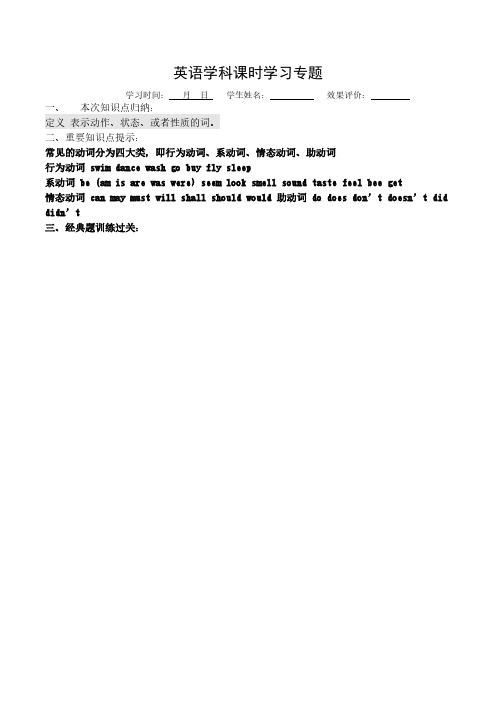
英语学科课时学习专题学习时间:月日学生姓名:效果评价:一、本次知识点归纳:定义表示动作、状态、或者性质的词。
二、重要知识点提示:常见的动词分为四大类,即行为动词、系动词、情态动词、助动词行为动词 swim dance wash go buy fly sleep系动词 be (am is are was were) seem look smell sound taste feel bee get情态动词 can may must will shall should would 助动词do does don’t doesn’t did didn’t三、经典题训练过关:将下面各组词组成句子。
(12分)1._____________________________? (you ,can ,hear me)2. ____________________________ (not,he ,dance,can )3.____________________________? (you,can ,see,what )4.____________________________(can ,see ,not ,we ,you)5._____________________________. (I ,can ,help ,you )6._____________________________? (I,can ,do,what)一)选择填空:(56分)1. My brother ____ a teacher. He ____ his pupils very much.A. is, likeB. is, likesC. are, likesD. are, like2. A: How many days ____ there in a week?B: There ____ seven.A. is, isB. are, areC. is, areD. are, is3. I ____ tired last night.A. becameB. feltC. lookedD. am4. Her face ____ pale(苍白)when she heard the bad news.A. gotB. isC. turnedD. was5. You ____ pale. What's wrong with you?A. turnB. seemC. lookD. bee6. The boy ____ ill today.A. areB. isC. beD. am7. Which ____ bigger, the sun or the moon?A. areB. isC. beD. ×8. Neither she nor I ____ a doctor.A. am notB. amC. areD. is9. I ____ a worker next year.A. amB. will beC. beD. will10. Her voice ____ like my mother's.A. soundsB. soundC. looksD. look11. It often rains and the crops ____ fast.A. getB. turnC. growD. bee12. A: How are you ____ now?B: Much better, thank you.A. gettingB. feelingC. makingD. turning13. The teacher's smile made me ____ better.A. feelB. to feelC. feelingD. felt14. My English teacher ____.A. all look youngB. looks youngC. look youngD. all looks young15. I ____ busy now, but I ____ free next week.A. am, amB. am, willC. am, will beD. being, will be16. I ____ at this school for about two months.A. amB. will beC. have beenD. was17. My brother ____ in the League(社团) for about five years.A. have beenB. has beenC. wasD. is18. e to my office if you ____ free tomorrow.A. areB. will beC. wasD. is19. If water ____ heated(加热), it will be ____ into vapour (蒸气).A. was, turnedB. is, turnedC. is. getD. was, got20. If you don't take back what you just said, Mother ____ angry.A. isB. will beC. getD. feels21. Neither of us ____ a doctor.A. amB. areC. isD. were22. He ____ a famous writer.A. turnsB. beeC. has beeD. has turned23. The girl's face ____ red.A. turnedB. gotC. feelD. look24. He ____ very glad.A. lookedB. turnedC. feelD. looks25. The flowers ____ fragrant (芳香).A. getB. smellsC. smellD. feels26. The table ____ very smooth(光滑的).A. lookB. turnC. feelsD. smell27. Jack ____ younger than Tom.A. lookB. feelC. feelsD. looks28. She looks ____.A. happyB. to be happyC. happilyD. that she is happy(二)把下列各句译成英语:(16分)1.天色渐黑,咱们回家吧。
小学英语动词用法训练题

小学英语动词用法训练题在小学英语的学习中,动词的用法是一个非常重要的知识点。
为了帮助同学们更好地掌握动词的用法,以下是一些精心设计的训练题。
一、选择题1、 I ______ football every dayA playB playsC playing答案:A解析:“I”是第一人称,后面接动词原形,所以选 A。
2、 She ______ singingA likeB likesC liking答案:B解析:“She”是第三人称单数,后面的动词要加“s”,所以选 B。
3、 They ______ to school by busA goB goesC going答案:A解析:“They”是复数,后面接动词原形,选 A。
4、 We ______ our homework in the eveningA doB doesC doing答案:A解析:“We”是复数,动词用原形,A 选项正确。
5、 He ______ TV on SundaysA watchB watchesC watching答案:B解析:“He”是第三人称单数,动词要加“es”,所以选 B。
二、用所给动词的适当形式填空1、 Look! The girls ______ (dance)答案:are dancing解析:“Look!”表示正在进行的动作,用现在进行时,结构是“be +动词的现在分词”,“girls”是复数,be 动词用“are”,“dance”的现在分词是“dancing”。
2、 My father often ______ (read) books in the evening答案:reads解析:“often”表示经常做的事情,用一般现在时,“My father”是第三人称单数,动词加“s”。
3、 The children ______ (have) a picnic last weekend答案:had解析:“last weekend”表示过去的时间,用一般过去时,“have”的过去式是“had”。
小学英语动词练习题

小学英语动词练习题小学英语动词练习题在小学英语学习中,动词是一个非常重要的部分。
学生们需要掌握各种动词的用法和时态变化。
为了帮助学生更好地掌握动词知识,老师们经常会给学生们布置动词练习题。
下面,我们来看一些常见的小学英语动词练习题。
一、动词的时态变化1. 请将下列动词变成过去式:play → __________eat → __________go → __________swim → __________run → __________2. 请将下列动词变成现在进行时:read → __________write → __________dance → __________sing → __________sleep → __________3. 请将下列动词变成将来时:do → __________see → __________go → __________eat → __________play → __________二、动词的用法1. 请用适当的动词填空:I __________ (like) ice cream.They __________ (watch) a movie now.She __________ (play) the piano very well.We __________ (study) English every day.He __________ (run) in the park every morning.2. 请用适当的动词完成句子:My mother __________ (cook) dinner every evening.The cat __________ (sleep) on the sofa.They __________ (play) basketball in the gym.Tom __________ (ride) his bike to school every day.We __________ (listen) to music in the car.三、动词的选择1. 请选出正确的动词形式填空:I __________ (am / is / are) a student.He __________ (like / likes / liking) to play soccer.They __________ (go / goes / going) to the park on weekends. She __________ (is / am / are) reading a book now.We __________ (are / is / am) going to the zoo tomorrow.2. 请选出正确的动词填空:The cat __________ (jump / jumps / jumping) over the fence.They __________ (run / runs / running) in the race.I __________ (swim / swims / swimming) in the pool.She __________ (play / plays / playing) the guitar very well.We __________ (dance / dances / dancing) at the party.以上是一些常见的小学英语动词练习题。
小学(完整版)英语情态动词专项练习及答案

小学(完整版)英语情态动词专项练习及答案一、选择题1.You'd better __________ hard from now on, __________ you will fail the exam. A.work; and B.working; or C.working; and D.work; or 2.To my joy, we_________ go to the bank. Mary has lent us some money. A.shouldn’t B.needn’t C.coul dn’t D.wouldn’t 3.—I think they are enough. We ________ make so many chairs.—I don’t think so. Because nearly a quarter of them need ________.A.don’t need to; mending B.needed; to be mendedC.don’t need; mend D.need; to mend4.We teenagers ________ have dreams. With dreams and hard work, anything amazing ________ be created.A.may; can B.might; should C.should; can D.must; has to 5.You ________ be careful with the camera. It costs!A.can B.will C.should D.may 6.—Who’s singing next door? Is it Miss Wang?—It ________ be her. She’s having the board meeting.A.can’t B.shouldn’t C.mustn’t D.needn’t 7.—Do we have to finish this today?—Yes, you ________ . Today is the last day.A.would B.may C.can D.must 8.—There is a knock at the door.—It ________ be my mom. She always comes back home at this time.A.may B.may not C.must D.can’t 9.—Will my car be ready by the end of the day?—It ________ be, sir. I’ll call if there’s any problem.A.must B.could C.shall D.should 10.We shouldn’t throw any objects from the buildi ng. Even a small object ________ cause serious injuries or death, when dropped from a great height.A.must B.should C.may D.need 11.—Dad, must we wait until the light becomes green?—Yes, I am afraid we ________. That’s the traffic rule.A.may B.can C.have to D.need 12.—Who’s the man over there? Is that Mr. Black?—It ________ be him. Mr. Black is much taller than that man.A.may B.must C.can’t D.mustn’t 13.— Is Lang Lang going to perform at Art Center this Friday?— Yes. It ________ be him. He has been here for three days.A.might B.must C.mustn’t D.may 14.— What do you think of the show yesterday?— Some of them were really good but others ________ be better.A.will B.must C.need D.can15.When you visit a museum, some instructions should ________ and we’d better not________ them.A.pay attention to; be against B.be paid attention; againstC.be paid attention to; against D.be paid attention to; be against16.I ________ hear you clearly. Would you please repeat it?A.mustn’t B.can’t C.needn’t D.shouldn’t 17.— Zoe, what do you think is the greatest advantage of shopping online?— At least I ______ spend much time going from shop to shop.A.shouldn’t B.can’t C.needn’t D.mustn’t18.---Will you be back early this evening?---Yes, but I ________ be a little late. Our boss sometimes has extra work for us.A.may B.must C.need D.will19.We’ve discussed every detail of this plan and have got everything ready. But still something __________ go wrong. We still have to be very careful.A.must B.should C.would D.may 20.—Amy, I hear you've got many foreign coins._______ I have a look?—Of course, I'll fetch them for you.A.May B.MustC.Should D.Need21.—Shall we go camping this summer holiday?—Nothing________be better.A.should B.could C.must D.may22.My bike was broken yesterday,so I____walk home.A.might B.had to C.must D.could 23.—Would you please________in that way? That’s not safe!—Sorry. I won’t do it any more.A.not driving B.not to drive C.no driving D.not drive 24.Think twice before making a decision, or you __________ get into trouble.A.may B.can't C.shouldn't D.mustn't25.—________ you give me a hand? I can’t put up the poster by myself.—No problem.A.Could B.Should C.Need D.Must26.—In China, many parents complain that their children have to stay up late to do the homework.—Don’t worry. The government has realized the problem. I’m sure there ________ be good news soon.A.can B.should C.need D.must 27.—Could I join you in the programme?—Sorry, you ________. You are too young.A.shouldn’t B.mustn’t C.can’t D.needn’t 28.—Who is singing next door? It sounds like a young girl’s voice.—It _________ be Jane. But she seldom sings English songs.A.need B.must C.may D.can29.Hurry up, or we ________ miss the beginning of the film.A.should B.must C.may D.have to30.— Excuse me, could you tell me where the Nanjing Brocade Museum is?—Go along this road for five minutes. You ________ miss it. It’s a huge building.A.mustn’t B.can’t C.needn’t D.shouldn’t 31.—Why didn’t you tell it to me earlier?— Why ________ I? I want to have my own secret.A.can B.may C.should D.shall 32.—Mum, why do I have to wear a mask before entering the supermarket?—For your health and safety, you ________ be too careful.A.shouldn’t B.can’t C.mustn’t D.needn’t33.A hard-working man ________ become a great scientist, but a great scientist ________ be a hard-working man.A.can’t; can B.may not; must C.can’t; must D.may not; can 34.You _________ smoke here! Look at the sign. It says "No smoking".A.needn't B.mustn't C.can D.may35.—Must I finish all my homework today, Mum?—No, you ________, my dear. You can finish some tomorrow if you like.A.needn’t B.shouldn’t C.can’t D.mustn’t 36.Most young people like shopping online because they ________ spend much time going from shop to shop.A.needn’t B.can’t C.mustn’t D.shouldn’t 37.—________ I see your ID card? We have to check your personal information.—Sure. Here you are.A.May B.Need C.Should D.Must38.—Will Jim come to Yangzhou for a holiday?—He ________come and it depends on how much homework he will have.A.may B.should C.must D.need39.—Is it really necessary for me to go shopping with a mask on?—I’m afraid you ________ in public. It is not only to protect yourself but also to protect others. A.must B.should C.can D.need40.I think all the students love the weekends because, to them, they ________ get up early on Saturdays or Sundays.A.mustn’t B.don’t need C.needn’t D.can’t41.Look at the floor, Tom! ________ you watch TV while having a meal?A.Should B.Could C.Must D.May42.— Excuse me. I ha ven’t finished reading the book yet. May I keep it a bit longer?— Sorry, you ________. You must return it on time.A.needn’t B.can’t C.won’t D.shouldn’t 43.Cars ________ give way to walkers on some roads in Binhai, or the drivers will be fined. A.may B.will C.can D.must44.You’ve got an A in the maths test again. You ________ be good at it.A.can B.may C.must D.should45.Mr. Black ________ be at home now. He went abroad on vacation last Friday.A.can’t B.mustn’t C.needn’t D.shouldn’t 46.— The sandstorm in Beijing is so serious this year.— Yes, I wonder when we ________ worry about the air we breathe.A.can’t B.mustn’t C.needn’t D.shouldn’t 47.—The article says that a person’s animal sign decides his personality.—You ________ read it for fun, but don’t bel ieve in that.A.can B.must C.shouldn’t D.needn’t 48.—How beautiful the winter jasmines (迎春花) are!—Yes. These golden-yellow flowers ________ be widely seen in my city in March.A.must B.can C.would D.should 49.—Mum, I bought some strawberries on my way home.—Oh, you’re so sweet. But the strawberries ________ be put into the fridge for freshness. A.must B.can C.may D.need50.— Mum, why do I have to wash hands so many times a day?—You ________ be too careful, for your health.A.can’t B.mustn’t C.may not D.n eedn’t【参考答案】***试卷处理标记,请不要删除一、选择题1.D解析:D【详解】句意:你最好从现在开始努力学习,否则你考试会不及格的。
(完整版)小学英语-Be动词的用法总结及专项练习

星光教育暑期班英语内部资料一.Be动词的用法总结及专项练习Be动词的用法口诀:be动词am\is\are,我(I)用am,你(you)用are,is连着他(he),她(she),它(it);单数名词用is,复数名词全用are。
我们(we)你们(you)和他们(they)都用are;过去式am\is变was,are变 were;变疑问,往前提,句末问号莫丢弃。
变否定,更容易,be后not莫忘记。
疑问否定任你变,句首大写莫迟疑。
二、Be动词专项练习题(一.)用be动词的适当形式填空。
1. I ________ from Australia.2. She _______ an English student.3.Mike and Tom _________ my friends.4. My parents _______ very busy every day.6.I ______ an English teacher now.7.Where _________ you from?10.The light _________ green.11.My name _________ Li Lei. I _________ twelve.12._______they your new friends?13. I ______ a boy. ______you a boy? No, I _____ not.14. The girl______ Jack's sister.15. The dog _______ tall and fat.16. ______ your brother in the classroom yesterday?17. Where _____ your mother? She ______at home.18. Whose dress ______ this?19.That ______ my red skirt.20.Who ______ I?21. Some tea ______ in the glass.22.Jhon ______ busy last weekend..23. My sister's name ______Nancy.24. This ______ not Wang Fang's pencil.25. ______ David and Helen from England?26. We ____ friends.27. She ___ a teacher.28. I ___ a girl.29. Many ants ____ in my house.30.His mother ____ fat.(二.)写出下列词适当形式:1.I am (缩略形式) ______2.is (复数)______3.we are (缩略形式) ______4.are not(缩略形式) ______5.is not (缩略形式) ______6.is/am(过去式形式) ______7.she's(完整形式) ______ 8.it's(完整形式) ______9.they're(完整形式) ______ 10.are(过去式形式) ______(三. )将下列句子变成否定句和一般疑问句,再作肯定和否定回答。
小学英语动词专项练习(解析版答案)

动词专项练习一(解析版答案)一、找出不同类的单词。
(B)1、A. ate B. fly C. bought D. did解析:ate、bought、did是动词过去式,fly是动词原形,故选B(D)2、A. run B. swim C. walk D. her解析:run、swim、walk是动词原形,her是人称代词(A)3、A.want B.went C.played D.cooked解析:want是动词原形,went、played、cooked是动词过去式(C)4、A.took B.did C.swim D.hurt解析:took、did、hurt是动词过去式,swim是动词原形。
(C)5、A.read B.could C.drink D.came解析:read、could、came是动词过去式,drink是动词原形。
二、用be动词的适当形式填空(做此类题目应当遵从主谓一致原则,主语是单数,be动词是单数形式,主语是复数,be动词是复数形式)1、Is your father a worker. Yes, he is.解析:your father主语,属于第三人称单数,遵从主谓一致原则,所以后面的Be动词应是is.2、They are in the classroom.解析:They是人称代词,是复数形式,遵从主谓一致原则,所以后面的Be动词应是are.3、Where are my books?解析:books是名词复数形式,遵从主谓一致原则,所以Be动词应是are4、These are her pears.解析:pears是名词复数形式,遵从主谓一致原则,所以Be动词应是are5、How much is the T-shirt?解析:how much意为“多少钱”时,可单独使用,也可构成词组how much money,但英语中常省略money,用来询问某物的价钱、价格。
how much后接be动词时,be是单数还是复数,取决于be之后的名词,T-shirt是名词单数形式。
完整版)小学英语动词及专项训练
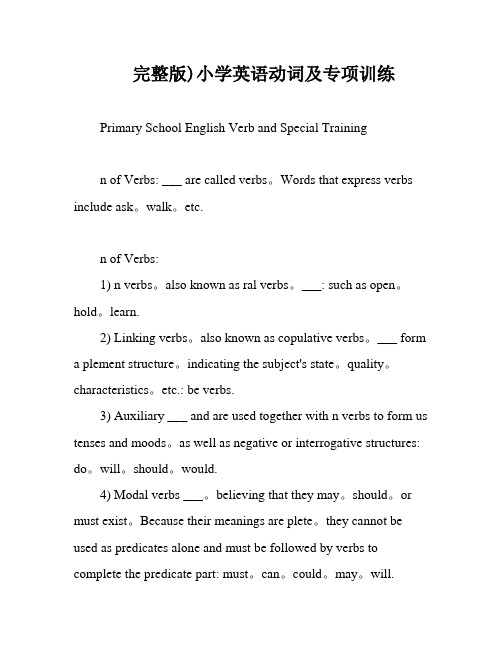
完整版)小学英语动词及专项训练Primary School English Verb and Special Trainingn of Verbs: ___ are called verbs。
Words that express verbs include ask。
walk。
etc.n of Verbs:1) n verbs。
also known as ral verbs。
___: such as open。
hold。
learn.2) Linking verbs。
also known as copulative verbs。
___ forma plement structure。
indicating the subject's state。
quality。
characteristics。
etc.: be verbs.3) Auxiliary ___ and are used together with n verbs to form us tenses and moods。
as well as negative or interrogative structures: do。
will。
should。
would.4) Modal verbs ___。
believing that they may。
should。
or must exist。
Because their meanings are plete。
they cannot be used as predicates alone and must be followed by verbs to complete the predicate part: must。
can。
could。
may。
will.Basic Form of Verbs:1) Infinitive: The original form of the verb without any changes。
小学英语动词专项练习

小学英语动词专项练习一、动词的基本概念和用法动词是表示动作、行为、存在或状态的词语。
它在句子中可以充当谓语,描述主语的动作或状态。
动词的时态包括一般现在时、一般过去时和一般将来时等。
根据句子的需要,可以根据主语的人称和数量进行变化。
二、动词的时态练1.选择合适的动词填空:1.She _____________ (play/plays) the piano every day.2.They _____________ (go/goes) to the park yesterday.3.I _____________ (am/is/are) going to ___.4.We _____________ (visited/visit) the museum last month.2.根据句意选择正确的动词形式:1.My mother _____________ (cook/cooks) us meals.2.The baby _____________ (cry/cries) when she is hungry.3.They _____________ (like/likes) playing basketball.4.We _____________ (are/is/am) going to watch a movie this weekend.三、动词的否定形式练1.将下列肯定句改为否定句:1.___.2.___.3.I have ___.4.We can swim in the pool.2.在括号内填入合适的否定词形成否定句:1.He _____________ (do) his homework every day.2.They _____________ (like) ice cream.3.She _____________ (have) a pet dog.4.We _____________ (go) to the beach last weekend.四、动词的进行时练1.根据句意选择正确的动词形式:1.I _____________ (am/is/are) studying for the test right now.2.They _____________ (play/playing) ___.3.She _____________ (cook/cooking) ___.4.We _____________ (are/is/am) going to the party this evening.2.根据句子填入动词的正确进行时形式:1.Look。
(完整版)小学英语动词过去式变化总结及练习题(最新整理)

直接加 edwalk 走climb 爬turn 转弯learn 学习cook dinner 做饭play the piano 弹钢琴visit grandparents 看望(外)祖父母clean the bedroom 打扫卧室wash the clothes 洗衣服answer the phone 接电话listen to music 听音乐clean the room 打扫房间jump 跳row 划work 工作show 展示look 看help 帮助relax 放松return 归还pass 传递watch TVpick up leaves 采摘树叶paint 绘画kick 踢ski 滑雪直接加 dlike 像,喜欢live 居住dance 跳舞use a computer 使用计算机love 爱taste 尝close 关上prepare 准备不规则变化eat 吃have 有;吃buy 买take 买;带go 去sing 唱歌teach(taught)教run(ran)跑fight(fought)打架get up 起床swim 游泳fly 飞swing(swung)荡sleep(slept)睡觉sweep(swept) the floor 扫地do 做make the bed 铺床draw(drew) pictures 画画write(wrote) a letter 写信catch (caught)butterflies 捉蝴蝶meet(met)见面drink(drank)喝tell(told)告诉ride(rode)骑find(found)寻找到drive(drove)驾驶come(came)来become(became)变成feel(felt)感觉到think(thought)思考meet(met)遇见fall(fell)落下leave 离开wake(woke) up 醒来bring 带来is am are see 看到grow 种植grew stand(stood)站立词形不变read books 读书put 放set the table 摆饭桌hit (hit)撞击、打cut 切、割最后一个字母双写再加 edstop(stopped)停shop 购物把 y 变成 i 再加 edempty the trash 倒垃圾一、单项选择( ) 1. The girl a red sweater is duty today.A. in, onB. in, inC. on, inD. on, on( ) 2. It’s very cold, your coat, please, Kate.A. put offB. put onC. puts onD. put in( ) 3. —— What day is today?—— It's .A. MondayB. a fine dayC. September 1stD. weekday ( ) 4. Shall we home?A. goB. goingC. goesD. went( ) 5. How much is the hot dog?A. TwoB. Three dollarsC. Four hot dogsD. Very much ( ) 6. Whose book is it? It’s not book, It’sA. my ,herB. mine ,hersC. My , hersD.mine,she二、阅读下面短文,选出最佳选项,将其序号填入提前括号内。
小学六年级英语语法专项练习题:动词
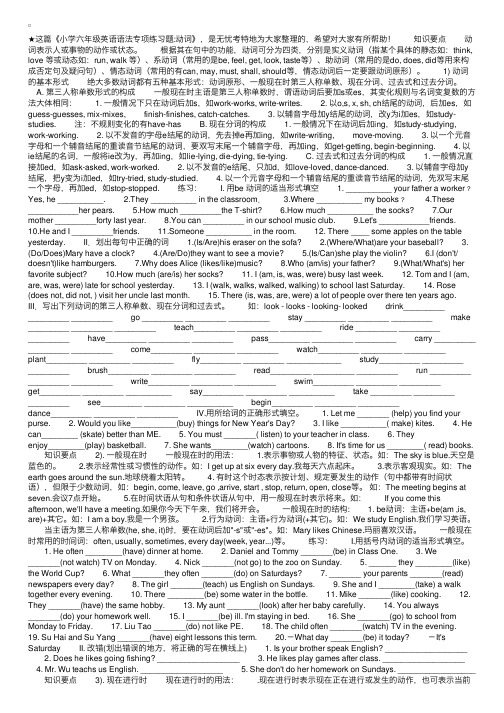
★这篇《⼩学六年级英语语法专项练习题:动词》,是⽆忧考特地为⼤家整理的,希望对⼤家有所帮助! 知识要点 动词表⽰⼈或事物的动作或状态。
根据其在句中的功能,动词可分为四类,分别是实义动词(指某个具体的静态如:think, love 等或动态如:run, walk 等)、系动词(常⽤的是be, feel, get, look, taste等)、助动词(常⽤的是do, does, did等⽤来构成否定句及疑问句)、情态动词(常⽤的有can, may, must, shall, should等,情态动词后⼀定要跟动词原形)。
1) 动词的基本形式 绝⼤多数动词都有五种基本形式:动词原形、⼀般现在时第三⼈称单数、现在分词、过去式和过去分词。
A. 第三⼈称单数形式的构成 ⼀般现在时主语是第三⼈称单数时,谓语动词后要加s或es,其变化规则与名词变复数的⽅法⼤体相同: 1. ⼀般情况下只在动词后加s,如work-works, write-writes. 2. 以o,s, x, sh, ch结尾的动词,后加es,如guess-guesses, mix-mixes, finish-finishes, catch-catches. 3. 以辅⾳字母加y结尾的动词,改y为i加es,如study-studies. 注:不规则变化的有have-hasB. 现在分词的构成 1. ⼀般情况下在动词后加ing,如study-studying, work-working. 2. 以不发⾳的字母e结尾的动词,先去掉e再加ing,如write-writing, move-moving. 3. 以⼀个元⾳字母和⼀个辅⾳结尾的重读⾳节结尾的动词,要双写末尾⼀个辅⾳字母,再加ing,如get-getting, begin-beginning. 4. 以ie结尾的名词,⼀般将ie改为y,再加ing,如lie-lying, die-dying, tie-tying.C. 过去式和过去分词的构成 1. ⼀般情况直接加ed,如ask-asked, work-worked. 2. 以不发⾳的e结尾,只加d,如love-loved, dance-danced. 3. 以辅⾳字母加y 结尾,把y变为i加ed,如try-tried, study-studied. 4. 以⼀个元⾳字母和⼀个辅⾳结尾的重读⾳节结尾的动词,先双写末尾⼀个字母,再加ed,如stop-stopped. 练习: I. ⽤be 动词的适当形式填空 1. __________ your father a worker﹖Yes, he __________. 2.They __________ in the classroom. 3.Where __________ my books﹖ 4.These___________her pears. 5.How much _________the T-shirt? 6.How much __________ the socks? 7.Our mother _________forty last year. 8.You can _________ in our school music club. 9.Let's ___________friends. 10.He and I _________friends. 11.Someone __________ in the room. 12. There ____ some apples on the table yesterday. II.划出每句中正确的词 1.(Is/Are)his eraser on the sofa? 2.(Where/What)are your baseball? 3. (Do/Does)Mary have a clock? 4.(Are/Do)they want to see a movie? 5.(Is/Can)she play the violin? 6.I (don't/ doesn't)like hamburgers. 7.Why does Alice (likes/like)music? 8.Who (am/is) your father? 9.(What/What's) her favorite subject? 10.How much (are/is) her socks? 11. I (am, is, was, were) busy last week. 12. Tom and I (am, are, was, were) late for school yesterday. 13. I (walk, walks, walked, walking) to school last Saturday. 14. Rose (does not, did not, ) visit her uncle last month. 15. There (is, was, are, were) a lot of people over there ten years ago. III.写出下列动词的第三⼈称单数、现在分词和过去式。
小学英语语法专项练习-动词讲解及练习题

小学英语语法专项练习-动词讲解及练习题一、动词的概念动词是表示人、事物的动作、状态或存在的词,是英语句子中最核心的部分。
二、动词的分类1. 及物动词:需要加宾语才能构成句子的动词,例如:write、eat等。
2. 不及物动词:不需要加宾语也可以构成句子的动词,例如:laugh、sit等。
3. 助动词:辅助主要动词构成各种时态、语态和否定式,例如:be、do等。
三、动词时态动词时态表示动作发生的时间,常用的动词时态有以下几种:1. 一般现在时:表示现在正在发生的事情或经常性的动作。
2. 一般过去时:表示过去发生的动作或状态。
3. 一般将来时:表示将要发生的动作或状态。
4. 现在进行时:表示现在正在进行的动作或状态。
5. 过去进行时:表示过去某个时刻正在进行的动作或状态。
6. 将来进行时:表示将来某个时刻正在进行的动作或状态。
四、动词的练题1. 用所给动词的正确形式填空:1) He often ____(play) football with his friends after school.2) My father ____(be) a doctor when he was young.3) They ____(visit) the museum tomorrow morning.4) She ____(watch) TV now.2. 根据括号内的提示写出动词正确的形式:1) He usually ____(drink) milk in the morning. (一般现在时)2) We ____(cook) dinner at six o'clock last night. (一般过去时)3) Tomorrow we ____(go) to the park to have a picnic. (一般将来时)4) Look! The boy ____(swim) in the river. (现在进行时)以上是小学英语语法专项练习-动词讲解及练习题,希望有所帮助!。
- 1、下载文档前请自行甄别文档内容的完整性,平台不提供额外的编辑、内容补充、找答案等附加服务。
- 2、"仅部分预览"的文档,不可在线预览部分如存在完整性等问题,可反馈申请退款(可完整预览的文档不适用该条件!)。
- 3、如文档侵犯您的权益,请联系客服反馈,我们会尽快为您处理(人工客服工作时间:9:00-18:30)。
小学英语动词及专项训练1.动词的定义:表示动作或状态的词叫做动词。
表示动词的词如ask ,walk 等2.动词的分类:(1)实义动词又叫行为动词,能独立做谓语:如open,hold , learn (2)系动词又称连系动词,不能独立做谓语,后边必须接表语组成系表结构,说明主语的状态、性质、特征等:be 动词(3)助动词,主要协助动词构成谓语动词词组的词叫做助动词。
它本身没有词义,和实义动词一起构成各种时态和语态,也可构成否定或疑问结构:do、will、should、would(4)情态动词,表示说话人对有关行为或事物的态度和看法,认为其可能、应该或必要等。
由于词义不完全,不能单独作谓语,要后接动词完成谓语部分:must、can、could、may、will3.动词的基本形式(1)动词原形:动词未经任何变化的原来形式。
如:have、cut、see(2)第三人称单数现在时:动词一般现在时的第三人称单数形式的构成和名词复数构成法相似。
A.直接加“ s” :read--reads leave---leavesB.以 e 结尾的动词,直接加“ s ” : come--comes close---closesC.以s. x. sh. ch.o结尾的单词,加“ es ” : watch---watches fix---fixes wash---washes go--goesD.以“辅音字母+y”结尾的单词,变“ y”为“ i”, 再加“ es” : cry---criesE.以“元音字母+y”结尾的单词,直接加“ s” :play---plays(3)过去式的变化规则:A.直接加“ ed”:look--looked watch---watchedB.以 e 结尾的动词,直接加“ d” : live--lived love--lovedC.以“辅音字母+y”结尾的单词,变“ y”为“ i”, 再加“ed ”: cry---criedD.以“元音字母+y”结尾的单词,直接加“ s ” :play---playedE. 动词不规则变化表Infinitive Pasttense Infinitive Past tense1. am, is was2. keep kept3. are were4. let let5. become became6.make made7. begin began8. meet met9. bite bit10 put put11. blow blew12. read read13. buy bought14. ride rode15. catch caught16.run ran17. come came18.say said19. cost cost20. see saw21. cut cut22. sing sang23.dig dug24. sit sat25.do did26 sleep slept27. draw drew28.speak spoke29. drink drank30.sweep swept31. eat ate32. take took33.fall fell34.teach taught35. feed fed36.tell told37.feel felt38.think thought39. fly flew40. throw threw41.forget forgot 42.understan dunderstood43. get got44.give gave45. wake woke46.go went47. wear wore48.grow grew49. win won50.have/has had51. write wrote52.know knew53 .break broke4.动词的时态一、一般现在时: 表示经常性、规律性习惯性的动作或现在存在的状态。
结构:1. 动作词一般用原形,但如果是第三人称单数时(如Tony ,he ,she ),动作词用第三人称单数形式,即加s 或es ;在主语前加do, does帮助疑问句,后面的动词用原形;在动作词前加don't, doesn't 帮助否定句,后面的动词用原形。
2. 句子中没动作词时,用 be 动词: is , am , are ; is , am , are 放在主语前帮助疑问句; is , am , are 后面加上 not 帮助否定句。
3. 情态动词 can, may, should ,must 引起的句子是一般现在时,后面接动词用原形; can, may, should ,must 放在主语前帮助疑问句,后面接动词用原形; can, may, should, must 后面加上 not 帮助否定句,后面接动词用原形。
4. 肯定祈使:动词原形 + 其它 否定祈使句: Don 't +动词原形 + 其它5.感叹句: What a mess! What a beautiful desert! What beautiful flowers! —— What+( 形 )名A. 肯定句: (非第三人称单数 )主语 +V+其它 (第三人称单数 )主语 +Vs+ 其它 主语 +be (is, am, are)+ 其它 主语 + 情态动词 (can, may, should, must)+V+ 其它 She must go.B. 否定句: ( 非第三人称单数 ) 主语 +don 't +V+ 其它 We don 't come from China.(第三人称单数 ) 主语 +doesn 't +V+ 其它 He doesn 't come from China.主语 +be (is, am, are) not+ 其它 I aren ' t from China. 主语 + 情态动词 (can, may, should, must)+not +V+ 其它 般疑问句: Do +( 非第三人称单数 ) 主语 +V+ 其它Does +( 第三人称单数 )主语 +Vs+ 其它 be (Is, Am, Are)+ 主语 + 其它二、现在进行时 : 表示现在正在进行的动作。
结构: 1. be 动词( is , am , are) + 动词 ing (现在分词);is , am , are 放在主语前帮助疑问句,后面的动词加 ing ; is , am , are 后面加上 not 帮助否定句,后面的动词加 ing 。
A. 肯定句 :主语+be ( is, am, are ) +Ving +其它 They are coming here.B. 否定句:主语 +be ( is, am, are ) +not +Ving +其它 They aren 't coming here.C. 一般疑问句: be ( Is, Am, Are )+主语 + Ving + 其它 Are they coming here?D. 特殊疑问句: 特殊疑问词 + be ( is, am, are )+主语 + Ving +其它 What arethey doing?三、一般过去时:表示过去某个时间里发生了的动作或状态。
结构:1. 动作词用过去式 (ed ) ;在主语前加 did 帮助疑问句,后面的动词用原形; 在动作词前加 didn 't 帮助否定句,后面的动词用原形。
2. 句子中没动作词时,用 be 动词的过去式: was , were ;was , were 放在主语前帮助疑问句;How beautiful!How beautiful the flower is!How beautiful the flowers are! —— How+ 形 We come fromChina. He comes from China. We are fromDo you come from China? Does he come fromChina?Are you from China? D . 情态动词 (Can, May, Should, Must) 特殊疑问句: 特殊疑问词 She can 't go. Where do you come from? +主语 + V+ 其它 ) 主语 +V+ 其它 )主语 +Vs+ 其+do +( 非第三人称单数 +does +( 第三人称单数 +be (is, am, are)+ 主语 + 其它 特殊疑问词 +情态动词 (Can, May, Should, Must)+ 主语 + V+ 其它特殊疑问词 特殊疑问词 Where does he come from? Where are you from?Can she go?C .was , were后面加上not 帮助否定句。
A. 肯定句:主语+Ved+ 其它We came from China主语+be (was, were)+ 其它We were from China.B. 否定句:主语+didn 't +V + 其它We didn 't come from China.主语 +be (was, were) +not+ 其它 We weren ' t from China. C .一般疑问句: Did +主语 +V + 其它 Did you come from China?be (Was, Were)+ 主语 + 其它 Were you from China?D .特殊疑问句:特殊疑问词 + did +主语 +V +其它 Where did you from?特殊疑问词 + be (was, were) +主语 +其它 Where were from? 四、一般将来时:表示将来某个时间的动作或状态。
结构:1. be going to + 动词原形is , am , are 放在主语前帮助疑问句; is , am , are 后面加上 not 帮助否定句。
2. will+ 动词原形will 放在主语前帮助疑问句,后面接动词用原形; will 后面加上 not 帮助否定句,后面接动词用原形A. 肯定句:主语 +will +V + 其它 主语 + be going to +V + 其它B. 否定句:主语 +will not +V + 其它 主语 + be not going go +V +其它C .一般疑问句: Will+ 主语 +V+ 其它Be(Is, Am, Are) + 主语 going to +V+ 其它 Is he going to did a hole?D .特殊疑问句:特殊疑问词 +will+ 主语 +V+ 其它 What will he do?特殊疑问词 +be(is, am, are) + 主语 going to +V+ 其它 What is he going to do?五、过去进行时:表示过去某时正在进行的动作。
